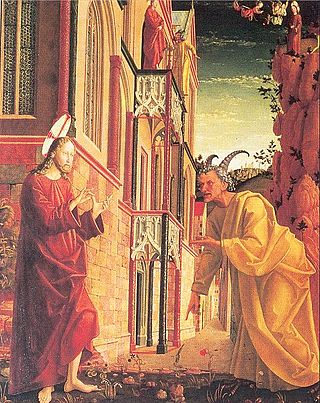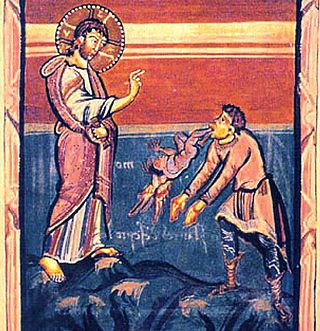Related Research Articles

Matthew 2:2 is the second verse of the second chapter of the Gospel of Matthew in the New Testament. The magi travelling from the east have arrived at the court of King Herod in Jerusalem and in this verse inform him of their purpose.

Matthew 2:15 is the fifteenth verse of the second chapter of the Gospel of Matthew in the New Testament. In the verse, Joseph has taken Jesus and his family to Egypt to flee the wrath of King Herod.

Matthew 4:5 is the fifth verse of the fourth chapter of the Gospel of Matthew in the New Testament. Jesus has just rebuffed Satan's first temptation, and in this verse the devil transports him to the site of the second temptation.

John 3 is the third chapter of the Gospel of John in the New Testament of the Christian Bible. It deals with Jesus' conversation with Nicodemus, one of the Jewish pharisees, and John the Baptist's continued testimony regarding Jesus. Baptist preacher Charles Spurgeon said of this chapter that it is the one he would choose "to read to a dying man who did not know the gospel, [as] the most suitable one for such an occasion".

Matthew 14 is the fourteenth chapter in the Gospel of Matthew in the New Testament section of the Christian Bible. It continues the narrative about Jesus' ministry in Galilee and recounts the circumstances leading to the death of John the Baptist.

Luke 9 is the ninth chapter of the Gospel of Luke in the New Testament of the Christian Bible. It records the sending of the twelve disciples, several great miracles performed by Jesus, the story of his transfiguration, Peter's confession and the final departure from Galilee towards Jerusalem. Scottish minister William Robertson Nicoll describes this chapter as unfolding "sundry particulars which together form the closing scenes of the Galilean ministry". The book containing this chapter is anonymous, but early Christian tradition uniformly affirmed that Luke the Evangelist composed this Gospel as well as the Acts of the Apostles.

Luke 23 is the twenty-third chapter of the Gospel of Luke in the New Testament of the Christian Bible. The book containing this chapter is anonymous, but early Christian tradition uniformly affirmed that Luke the Evangelist composed this Gospel as well as the Acts of the Apostles. This chapter records the trial of Jesus Christ before Pontius Pilate, Jesus' meeting with Herod Antipas, and his crucifixion, death and burial.
Matthew 14:3 is the third verse in the fourteenth chapter of the Gospel of Matthew in the New Testament.
Matthew 14:4 is the fourth verse in the fourteenth chapter of the Gospel of Matthew in the New Testament.

Matthew 8:18 is the 18th verse in the eighth chapter of the Gospel of Matthew in the New Testament.
Matthew 14:13 is the thirteenth verse in the fourteenth chapter of the Gospel of Matthew in the New Testament.

Matthew 14:23 is a verse in the fourteenth chapter of the Gospel of Matthew in the New Testament.

Matthew 14:26 is a verse in the fourteenth chapter of the Gospel of Matthew in the New Testament.
Matthew 14:22 is a verse in the fourteenth chapter of the Gospel of Matthew in the New Testament.

John 1:29 is the twenty-ninth verse in the first chapter of the Gospel of John in the New Testament of the Christian Bible.

John 1:25 is the twenty-fifth verse in the first chapter of the Gospel of John in the New Testament of the Christian Bible.
John 1:21 is a verse in the first chapter of the Gospel of John in the New Testament.
Matthew 12:14-16 is a set of verses in the twelfth chapter of the Gospel of Matthew in the New Testament.
Matthew 12:17-18 are two verses in the twelfth chapter of the Gospel of Matthew in the New Testament.

Matthew 13:1-2 are the first two verses in the thirteenth chapter of the Gospel of Matthew in the New Testament.
References
- ↑ John MacEvilly, An Exposition of the Gospel of St. Matthew consisting of an analysis of each chapter and of a Commentary critical, exegetical, doctrinal and moral, Dublin, Gill & Son 1879.
- 1 2 Thomas Aquinas, ed. (1874). "Catena Aurea: commentary on the four Gospels; collected out of the works of the Fathers. Oxford: Parker".
 This article incorporates text from this source, which is in the public domain .
This article incorporates text from this source, which is in the public domain .